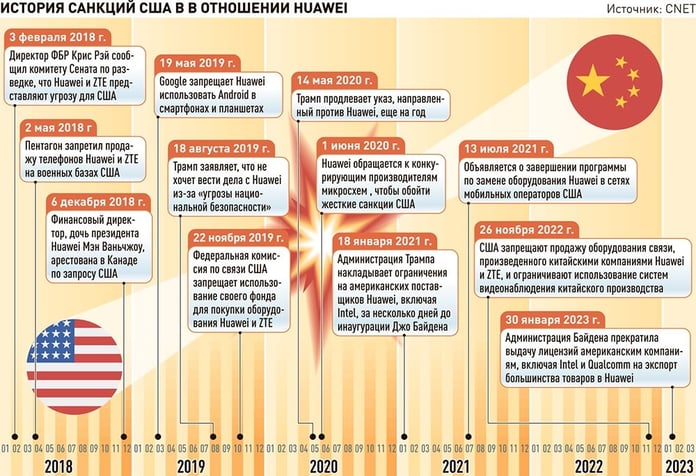In 2022, China has become a key consumer and industrial electronics supplier for Russia, so the state of its electronics industry is also important for Russia.
There have been no official statements from US presidential administration officials yet, but information about the new restrictions, citing sources, has already been published by Bloomberg, Reuters, the Wall Street Journal and the Financial Times. There is no doubt that the Chinese IT sector will face new problems, the question is in the details.
Huawei will have the hardest time as it is likely that Intel, AMD, Qualcomm and a number of other US tech companies will have their temporary licenses to supply their products to the Chinese IT giant revoked.
If these restrictions are not temporary, they could be a severe blow to Huawei’s business.
Most of Huawei’s servers and laptops are now made using Intel and AMD processors, and if US companies stop selling them, it will spell disaster for this division of Huawei. It is impossible to replace the two largest processor manufacturers in the short to medium term.
Huawei laptops are well known to Russian consumers. In recent years, Huawei has increased its share of the Russian market in this segment.
The situation with the revocation of licenses from Qualcomm, the largest developer of processors for smartphones and tablets, is less tragic. Firstly, there is Taiwanese MediaTek, which in theory can replace Qualcomm, and secondly, Huawei has a subsidiary HiSilicon Technologies, which develops its own processors on the ARM architecture.
< p class="">According to Eldar Murtazin, a leading analyst at Mobile Research Group, if the announced restrictions are introduced, then Huawei will have to revamp its entire range of smartphones, since it is now based on Qualcomm processors, and it will take time to launch new ones. models. . "Huawei has a strong engineering team, and they will certainly cope with such a task. But it will take at least one and a half to two years to start production of Kirin processors in China," the expert believes. Photo: Infographic "RG" / Leonid Kuleshov / Dmitry Bevza China itself reacted with unusual speed to the disclosure of sanctions against Huawei. Sanctions against Huawei weren't the only blow to China's electronics industry. There were reports that Japan and the Netherlands would limit the supply of the latest equipment for the production of chips to China. The Joe Biden administration negotiated with Japan and the Netherlands for two years, but faced resistance because it worried about how it would affect their chip companies, including ASML in the Netherlands. Bas, Tokyo Electron Ltd. and Nikon in Japan. Although we assume that some Chinese factories will have problems with microchip production, these suppliers will not be difficult to replace. Despite the fact that China is the main supplier of chips for Russian electronics manufacturers, experts believe that the ban on supplying lithographic machines to this country will not affect Russian electronics manufacturers. According to MForum Analytics analyst Aleksey Boyko, supplies of equipment in this class are mainly needed to expand production. Devices that have already been purchased can work for several more years if they can be maintained on their own. Which, according to Boyko, is very real. "It's unlikely to affect the Russian market in any way. At least not now," said the MForum analyst. He also noted that Chinese companies involved in the development and production of their own lithography and other equipment for the production of semiconductor devices are now subject to state support, which will allow them to accelerating the development of their own analogues. "Relevant work will take several years, after which the share of Chinese production equipment in enterprises producing microelectronics in China will begin to grow," Boyko said. Murtazin is also confident that Russian electronics manufacturers and retailers will have no problems with the purchase of processors and microcircuits, and in any case. "There is no shortage of microchips now, unlike in the covid period. The demand is less than the supply. Parallel imports are taking place, and there are many supply channels. Even if the it is imagined that some Chinese factories will have problems, it will not be difficult to replace these suppliers", - thinks the expert.


